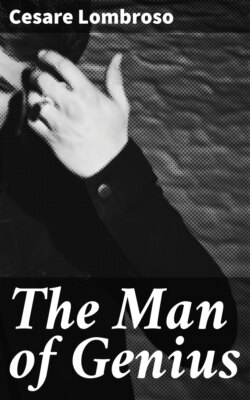Читать книгу The Man of Genius - Cesare Lombroso - Страница 3
На сайте Литреса книга снята с продажи.
ОглавлениеPART I.
THE CHARACTERISTICS OF GENIUS.
Table of Contents
CHAPTER I.
History of the Problem.
Table of Contents
Aristotle—Plato—Democritus—Felix Plater—Pascal—Diderot—Modern writers on genius.
IT is a sad mission to cut through and destroy with the scissors of analysis the delicate and iridescent veils with which our proud mediocrity clothes itself. Very terrible is the religion of truth. The physiologist is not afraid to reduce love to a play of stamens and pistils, and thought to a molecular movement. Even genius, the one human power before which we may bow the knee without shame, has been classed by not a few alienists as on the confines of criminality, one of the teratologic forms of the human mind, a variety of insanity.
This impious profanation is not, however, altogether the work of doctors, nor is it the fruit of modern scepticism. The great Aristotle, once the father, and still the friend, of philosophers, observed that, under the influence of congestion of the head, “many persons become poets, prophets, and sybils, and, like Marcus the Syracusan, are pretty good poets while they are maniacal; but when cured can no longer write verse.”[5] And again, “Men illustrious in poetry, politics, and arts, have often been melancholic and mad, like Ajax, or misanthropic, like Bellerophon. Even in modern times such characters have been noted in Socrates, Empedocles, Plato, and in many others, especially poets.”[6]
In the Phædo, Plato affirms that “delirium is by no means an evil, but, on the contrary, when it comes by the gift of the gods, a very great benefit. In delirium, the prophetesses of Delphi and Dodona performed a thousand services for the citizens of Greece; while in cold blood they were of little use, or rather of none. It often happened that, when the gods afflicted men with fatal epidemics, a sacred delirium took possession of some mortal, and inspired him with a remedy for those misfortunes. Another kind of delirium, that inspired by the Muses, when a simple and pure soul is excited to glorify with poetry the deeds of heroes, serves for the instruction of future generations.”
Democritus was more explicit, and would not believe that there could be a good poet who was not out of his mind:—
